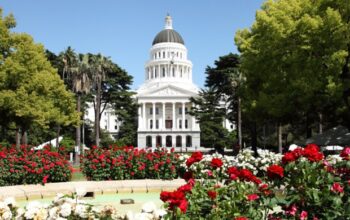Why is the cost of housing so high? In part due to government stealing from developers using high permits fees, forced unionization, solar mandate, electric only mandates and more. Government is killing the middle class. Now the Supreme Court declares that the permit process is to punish, not to help the community.
“The Supreme Court ruled on Friday that a California man could bring a constitutional challenge to fight fees he incurred to mitigate traffic congestion while building a house on a plot of land he owns.
“Nothing in constitutional text, history, or precedent supports exempting legislatures from ordinary takings rules, Justice Amy Coney Barrett, a Trump appointee, wrote for the unanimous court.
The court’s ruling said that property rights get the same amount of protection against legislators as they do against administrators.”
Biden has refused to abide by Supreme Court decisions—will Newsom do the same?
Supreme Court sides with California property owner in Fifth Amendment fight over permit fees
The high court’s ruling raises new questions about permit fees enacted by lawmakers.
KELSEY REICHMANN, courthousenews, 4/12/24 https://www.courthousenews.com/supreme-court-rules-for-california-property-owner-fighting-permitting-fees/
WASHINGTON (CN) — The Supreme Court ruled on Friday that a California man could bring a constitutional challenge to fight fees he incurred to mitigate traffic congestion while building a house on a plot of land he owns.
“Nothing in constitutional text, history, or precedent supports exempting legislatures from ordinary takings rules, Justice Amy Coney Barrett, a Trump appointee, wrote for the unanimous court.
The court’s ruling said that property rights get the same amount of protection against legislators as they do against administrators.
George Sheetz received a $23,420 bill from the El Dorado County Traffic Impact Mitigation Fee Program. The country charges developers with traffic impact fees to pay for a portion of road improvements necessary to offset traffic impacts from new infrastructure developments like roads and highways.
Sheetz wanted to build a 1,854-square-foot prefabricated house on his plot of land. He applied for a permit in 2016 and found out his development would come at a high cost.
In 2017, Sheetz tried to get a refund for his permitting fee, claiming it was unconstitutional. A trial court dismissed his case and the ruling was upheld on appeal.
The Supreme Court took up his appeal, hearing arguments in January. Sheetz argued that the county had violated two of the court’s prior rulings: Nollan v. California Coastal Commission and Dolan v. City of Tigard. Nollan and Dolan attempted to balance government and landowner interests by laying out a constitutional test for government permitting.
El Dorado argued Nollan and Dolan did not apply in Sheetz’s case because the impact fee was imposed by the legislature, more closely resembling a property-based charge.
Barrett said the takings clause of the Fifth Amendment — which prevents governments from seizing private property for public use — does not have a legislative exception. Rather, Barrett said, the clause restrains state authority.
“Just as the takings clause ‘protects ‘private property’ without any distinction between different types,’ it constrains the government without any distinction between legislation and other official acts,” Barrett wrote. “So far as the Constitution’s text is concerned, permit conditions imposed by the legislature and other branches stand on equal footing.”
Barrett said property owners’ right to compensation is balanced against the state’s police power, describing the two as more “like in-laws than soulmates.”
While the court’s ruling was unanimous, there was some division on the question of permitting fees. Barrett said governments can use building permits to further a legitimate police-power purpose and those conditions would not entitle the landowner to compensation.
Justice Sonia Sotomayor, an Obama appointee, was joined by Justice Ketanji Brown Jackson, a Biden appointee, in a concurring opinion that questioned whether the permitting condition would be compensable if imposed outside the permitting context.
Sotomayor said the California Court of Appeals did not address whether the traffic impact fee would require that property owners be compensated if it was imposed outside of the permitting context. Since that question wasn’t before the court, it is not answered by the ruling.
Justice Brett Kavanaugh, a Trump appointee, noted in a concurring opinion that the court also didn’t address whether a permit condition that affects a class of properties must be tailored similarly to a permit that applies to a particular development.
“Importantly, therefore, today’s decision does not address or prohibit the common government practice of imposing permit conditions, such as impact fees, on new developments through reasonable formulas or schedules that assess the impact of classes of development rather than the impact of specific parcels of property,” Kavanaugh wrote.
Justice Neil Gorsuch, a Trump appointee, wrote a concurring opinion to clarify that the ruling does not distinguish between government actions that affect a class of properties and actions that impact property.
Brian Hodges, an attorney with the Pacific Legal Foundation who represented Sheetz, praised the ruling for siding with property owners.
“Today’s ruling is a major victory for property rights, and a step in the right direction toward removing barriers to housing,” Hodges said. “We are thrilled with the Supreme Court’s decision and will continue fighting to protect property rights and make the process for building new homes more fair.”
The court’s ruling vacates the appeals court ruling and remands the case for further consideration.




Love it when the big guy, El Dorado County, loses to the little guy. individual property owner. Thank you, SCOTUS.